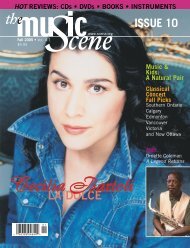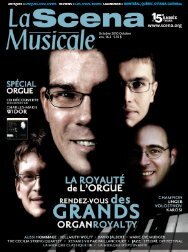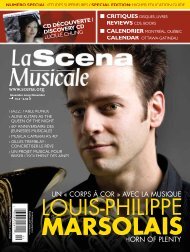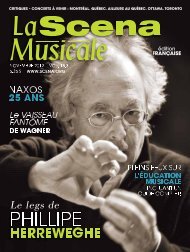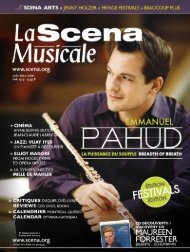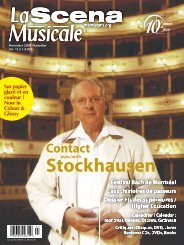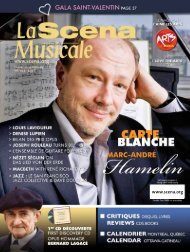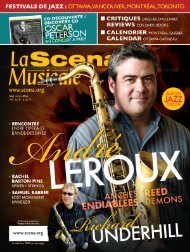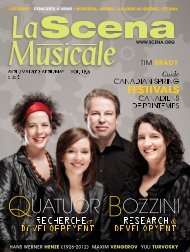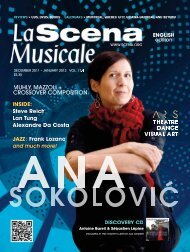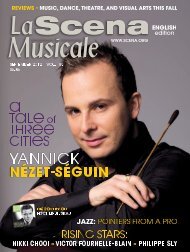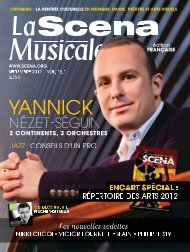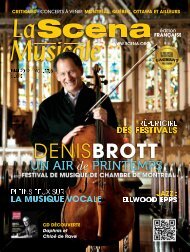You also want an ePaper? Increase the reach of your titles
YUMPU automatically turns print PDFs into web optimized ePapers that Google loves.
Pas de vacances estivales pour l’anglaise Jane Eaglen. <strong>La</strong> plus<br />
éminente Brünnhilde de sa génération rentrait au travail en<br />
juin pour l’événement de l’été, soit les trois représentations<br />
consécutives de L’Anneau du Nibelung de Wagner, à l’Opéra de<br />
Seattle. Deux mois de répétitions plus tard, L’Anneau de Seattle<br />
reçut des critiques favorables, avec une bonne part d’éloges pour<br />
Eaglen.<br />
L’interprétation de Brünnhilde relève de l’exploit. De tous les<br />
rôles de L’Anneau de Wagner, œuvre grandiose en quatre opéras,<br />
celui de l’héroïne, Brünnhilde, est sans contredit le plus exigeant: il<br />
requiert non seulement assez d’endurance pour chanter trois opéras<br />
en cinq soirs, mais aussi une voix puissante, qui porte au-delà de<br />
l’orchestration wagnérienne, de même qu’une grande sensibilité<br />
émotive pour donner souffle au drame. Parmi les plus grandes interprètes<br />
de ce rôle, on retrouve Frida Leider, Kirsten Flagstad et Birgit<br />
Nilsson. L’espoir d’aujourd’hui est Jane Eaglen, qui s’est jointe à la<br />
production de L’Anneau de Seattle en 2005, tout juste après avoir<br />
participé à une production du même cycle à Chicago.<br />
Bien qu’Eaglen ait chanté L’Anneau<br />
de nombreuses fois, cette production<br />
est différente en raison de la longueur<br />
de la période des répétitions (en<br />
prime, l’événement a lieu à Seattle, son<br />
lieu de résidence !) et aussi parce<br />
qu’Eaglen travaille avec le metteur en<br />
scène Stephen Wadsworth sur une<br />
reprise de la production de 2001 de<br />
L’Anneau à Seattle. «Cette fois-ci, le<br />
spectacle est plus satisfaisant du point<br />
de vue dramatique», affirme Eaglen.<br />
Wagner a une signification toute<br />
spéciale pour Eaglen. « Je suis née pour<br />
chanter Wagner », remarque-t-elle. Ce<br />
sentiment fut appuyé par d’autres alors<br />
qu’Eaglen était encore très jeune.<br />
«J’étudiais le piano à l’âge de cinq ans<br />
et, à un moment donné, je voulais être<br />
pianiste ou chef d’orchestre. Mon professeur<br />
de piano m’a suggéré d’étudier<br />
le chant et, après quelques leçons, j’en<br />
suis devenue une accro ! » Après<br />
quelques années de leçons avec un<br />
professeur local qui voyait en elle le<br />
potentiel d’une future Norma ou<br />
Brünnhilde, Eaglen a passé des auditions<br />
au Guildhall School of Music de<br />
Londres, mais elle ne fut pas acceptée.<br />
À l’age de 18 ans, Eaglen passa les auditions du Royal Northern<br />
College of Music à Manchester. Joseph Ward reconnut son potentiel<br />
et la prit comme étudiante. «Il croyait que le corps prenait du<br />
temps à développer suffisamment de force, dit Eaglen. Je n’avais<br />
pas une voix exceptionnelle à l’époque, mais il savait que ça<br />
demandait du temps.» En quelques semaines, Ward l’orienta vers<br />
des rôles tels que Norma et Brünnhilde. « Il a ciblé quatre ou cinq<br />
notes au cœur de ma voix qui avaient une sonorité particulière, se<br />
souvient Eaglen. Il croyait que je finirais par chanter les opéras de<br />
Bellini et de Wagner, donc aussi bien commencer à me familiariser<br />
avec la musique et les styles. Nous nous sommes mis à travailler des<br />
extraits de Bellini et de Wagner, mais c’était uniquement les extraits<br />
que j’étais capable de chanter: des lignes de “Casta Diva” de Norma<br />
ou encore la musique de Sieglinde extraite de Die Walküre, mais<br />
sans les notes aiguës. »<br />
Les notes aiguës sont venues avec le temps. <strong>La</strong> clé de son développement<br />
? « Nous avons travaillé une méthode de bel canto. Selon<br />
Ward, nous chantons avec tout le corps. Les cordes vocales et le<br />
souffle doivent être supportés par les muscles du corps. Nous avons<br />
développé le diaphragme afin qu’il appuie sur le souffle. Il faut plus<br />
d’intensité pour chanter des notes aiguës et pour chanter doux.<br />
Photo: Sony Classical<br />
It was a working summer for Brit Jane Eaglen. The pre-eminent<br />
Brünnhilde of her generation clocked into work in June for the summer’s<br />
hottest ticket, Seattle Opera’s three consecutive presentations<br />
of Wagner’s Ring Cycle. Two months of rehearsals later, the Seattle Ring<br />
opened to favourable reviews with Eaglen garnishing her share.<br />
Singing Brünnhilde is not an easy feat. Of all the roles in Wagner’s<br />
momentous four opera Ring Cycle, the heroine, Brünnhilde, is undoubtedly<br />
the most demanding, requiring the stamina to sing three operas<br />
over five nights, the vocal power to withstand the Wagnerian orchestration<br />
as well as the emotional sensitivity to give full breath to the drama.<br />
Great Brünnhildes of the past include Frida Leider, Kirsten Flagstad and<br />
Birgit Nilsson. Today’s hope is Jane Eaglen, who stepped into the 2005<br />
Seattle Ring on the heels of a March run of the Chicago Ring.<br />
Although Eaglen has sung the Ring many times, this time around it’s<br />
different due to the long rehearsal period (in her home turf of Seattle<br />
as a bonus!), and because she is working with director Stephen<br />
Wadsworth in a reprise of the 2001 Seattle Ring. “This time around it’s<br />
more satisfying dramatically,” said Eaglen.<br />
Wagner is special for Eaglen. “I was<br />
born to sing Wagner,” Eaglen remarked.<br />
Early opinions shared that sentiment. “I<br />
studied piano at age 5 and, at one point,<br />
wanted to be a pianist or conductor. My<br />
piano teacher suggested that I study<br />
singing and after a couple of lessons, I<br />
was hooked!” After a year of lessons with<br />
a local teacher who heard a Norma and<br />
Brünnhilde voice in her, she auditioned<br />
but was not accepted to London’s<br />
Guildhall School of Music.<br />
As an eighteen year-old, Eaglen<br />
auditioned at the Royal Northern<br />
College of Music in Manchester. Joseph<br />
Ward recognized her potential, and took<br />
Eaglen on as a student. “He believed in<br />
the body taking time to develop enough<br />
strength,” recalled Eaglen. “I didn’t have<br />
much of a voice at that time, but he knew<br />
that it would take time." Within weeks,<br />
Ward directed her toward roles such as<br />
Norma and Brünnhilde. "He spotted four<br />
or five notes in the middle of my voice<br />
that sounded like something", Eaglen<br />
remembered. "He believed that I'd sing<br />
the operas of Bellini and Wagner eventually,<br />
so we might as well begin learning<br />
the music and the styles. We worked on bits from Bellini and Wagner,<br />
but it was only the bits I could sing - lines from 'Casta Diva' from Norma<br />
or Sieglinde's music from Die Walküre, but without the high notes.”<br />
The high notes eventually came. What was the key to her development?<br />
“We worked on a bel canto method. Ward believed that we sing<br />
with the entire body. The chords and breath have to be supported with<br />
the muscles of the body. We developed the diaphragm to lean on the<br />
breath. High notes and singing soft require more intensity. Singing an<br />
opera is like running a marathon. When I give master classes, I want to<br />
leave the student with the sense that singing is hard physical work.<br />
Many singers don’t sing with their entire body.”<br />
In 1984, after four years under Ward’s careful nurturing, Eaglen<br />
joined the English National Opera singing support roles. Her breakthrough<br />
finally came when she played Donna Anna in Mozart’s Don<br />
Giovanni with the Scottish Opera, where she also took on Tosca and<br />
Norma.<br />
The British diva is particularly fond of the city of Seattle. In January<br />
1994, Eaglen stepped in at the last minute for Carole Vaness at the<br />
Seattle Opera’s production of Norma, and caused great excitement.<br />
Live recordings of her subsequent Norma, released on Opera d’Oro<br />
and EMI, were received with equall enthusiasm. Speight Jenkins, director<br />
of the Seattle Opera, acted quickly, “A few days after Jane Eaglen<br />
septembre 2005 september 25



